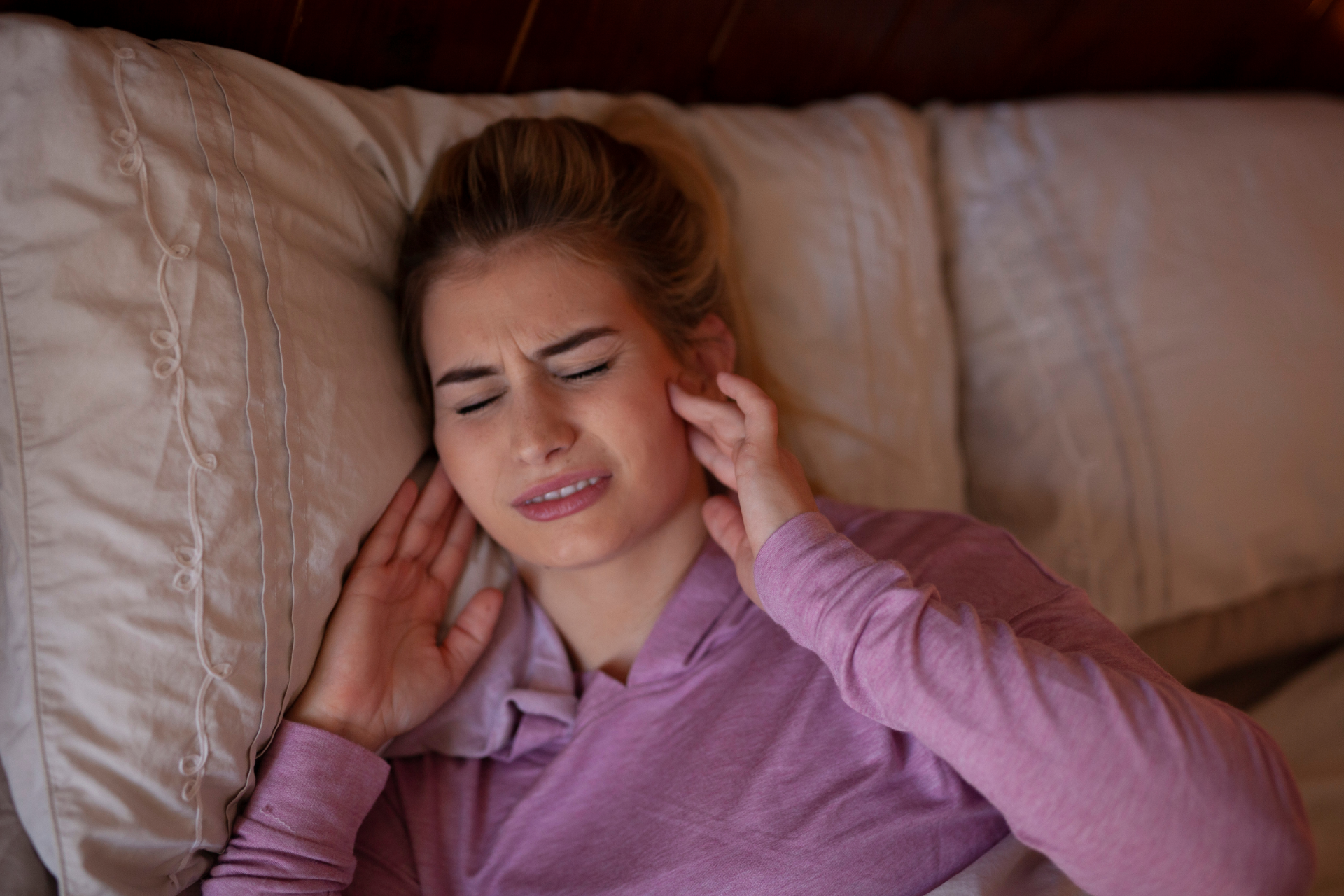Obstructive sleep apnea has been connected to many different health problems, even in places that you may not expect— like your mouth and teeth.
Before we dive into the link between sleep apnea and TMJ, let’s first talk about sleep apnea and why it’s so serious.
A Quick Refresher on Sleep Apnea
If you’re here, you probably already know a thing or two about sleep apnea. For the sake of argument we’ll go over it real quick, but you can jump right down to the TMJ section here if you’re already familiar with the disorder.
Obstructive sleep apnea (OSA) is a serious sleep disorder characterized by irregular breathing patterns while you sleep. Partial airway obstructions are called hypopneas while complete obstructions are called apnea. While these partial obstructions are far more common, they are just as serious. These irregular breathing patterns deprive your body and your brain of oxygen, and place undue stress on your cardiovascular system.
Common symptoms for obstructive sleep apnea include:
- Loud snoring (this tends to be the biggest sign that you have sleep apnea because snoring is the sound of hypopneas)
- Not feeling rested even after a full night’s sleep
- Morning headaches
- Dry mouth or sore throat in the morning
- Forgetfulness or brain fog during the day
Untreated sleep apnea can cause or worsen a lot of health problems, and has been linked to many health disorders including:
- Mental health problems, including depression and anxiety
- Diabetes
Left untreated, sleep apnea can also severely impact your quality of life, and make you feel exhausted and run-down in your day-to-day life.
What is TMJ?
TMJ is an abbreviation of “temporomandibular joint.” Appropriately enough, it’s a real mouthful. Your temporomandibular joint connects your jawbone to your skull, one on each side. TMJ can also stand for temporomandibular joint disorders, also known as TMD.
These disorders cause pain in your jaw joints, as well as in the muscles that move your jaw. Left untreated, TMJ pain or disorders can significantly impact your day-to-day life. It can affect your breathing, and the pain can make getting a good night’s sleep difficult.
Some symptoms of TMJ include:
- Jaw pain
- Difficulty chewing, or pain while chewing
- Pain around one or both jaw joints
- Ear pain
- Difficulty opening or closing your mouth
TMJ issues can be caused by a number of factors, including jaw injury, arthritis, or even genetics. It can be caused by other disorders too.
TMJ and Bruxism
Bruxism, better known as teeth grinding, occurs when you unconsciously clench your jaw or grind your teeth. This can occur both during the day, as well as at night. Many people who experience this aren’t even aware that it’s happening until they notice complications from the disorder.
While it may seem like a harmless habit, the consequences of untreated bruxism can be severe.
One of the primary concerns is the damage it can cause to your teeth. The constant grinding can wear down the enamel, leading to increased tooth sensitivity and vulnerability to decay. Over time, this can result in irreversible dental damage, necessitating costly and extensive dental treatments.
Moreover, bruxism can cause facial pain and discomfort in the jaw and temporomandibular joint (TMJ). The excessive pressure on these areas can contribute to the development of TMJ disorders, leading to further pain and limitations in jaw movement. [1]
What’s the Connection between TMJ and Sleep Apnea?
Studies have found that there is a significant association between TMJ disorders and obstructive sleep apnea. However, a firmly established link hasn’t yet been found; more research is needed to identify that connection.
Research has indicated that those who are at especially high risk of sleep apnea or display some of its key symptoms— loud snoring, hypertension, daytime sleepiness, or observed apnea— also had a higher chance of developing TMJ issues. They also were at higher risk of developing chronic TMJ disorders. [2]
This indicates that obstructive sleep apnea and TMJ symptoms can overlap, precede TMJ issues, and that their risk factors can overlap. Remember back to when we talked about bruxism; grinding your teeth or clenching your jaw can be an indicator of both sleep disorders and TMJ disorders.
Snatch A Good Night’s Sleep from the Jaws of Defeat
Thankfully, there’s plenty you can do to help prevent symptoms of both sleep apnea and TMJ issues. Here are a few of our tips:
- Approximately 90 percent of people who have sleep apnea are undiagnosed. That’s a lot of people experiencing poor sleep every night and not receiving treatment that can help them sleep better. If you’re having sleep problems and haven’t yet been diagnosed with a sleep disorder, get tested. An overnight sleep study can evaluate your sleep patterns and help your doctor or a sleep specialist determine the cause of your poor sleep. Once a cause has been found, you can start receiving the treatment you need to sleep better.
- If you’ve been diagnosed with sleep apnea, stick to your treatment. Sleep apnea treatment like CPAP therapy can not only prevent OSA’s characteristic breathing problems, but it can help prevent nighttime bruxism and allow you to sleep much more comfortably.
- Sleep on your side. Your sleep posture matters a lot when it comes to getting a good night’s rest. If you have sleep apnea, sleeping on your back can make it harder to get the air you need while you sleep. Sleeping on your back can also place strain on your jaw, putting you at risk for TMJ pain. Sleeping on your side makes it easier to breathe while you sleep, and keeps pressure off your jaw.
At first glance, jaw pain and sleep apnea may seem unrelated. However, if you’ve been reading our blog for a while, then you know that poor health and sleep apnea go hand-in-hand. There are so many health problems connected with sleep apnea and poor sleep, that it’s crucial to get tested for sleep disorders if you’ve been sleeping (and feeling) poorly.
Feeling sleepless in Tennessee? Contact the Sleep Centers of Middle Tennessee today to schedule a consultation. We can help you get the good night’s you deserve.
References
- “Bruxism (Teeth Grinding).” Mayo Clinic, Mayo Foundation for Medical Education and Research, 10 Aug. 2017, www.mayoclinic.org/diseases-conditions/bruxism/symptoms-causes/syc-20356095. Accessed 01 June 2023.
- Sanders, A E, et al. “Sleep Apnea Symptoms and Risk of Temporomandibular Disorder: Oppera Cohort.” U.S. National Library of Medicine, Journal of Dental Research, July 2013, www.ncbi.nlm.nih.gov/pmc/articles/PMC3706181/. Accessed 02 June 2023.



